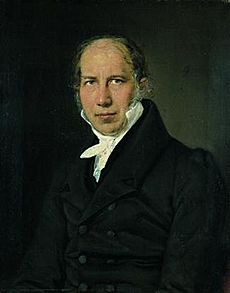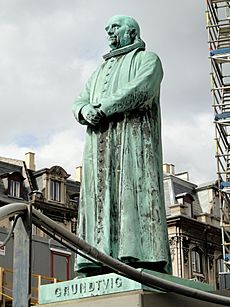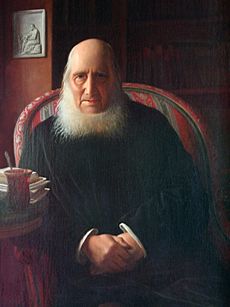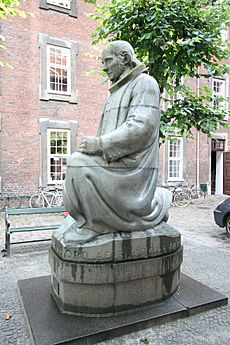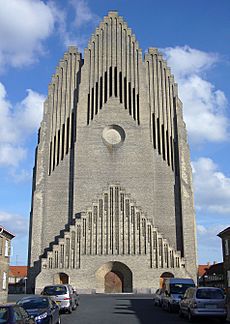N. F. S. Grundtvig facts for kids
Quick facts for kids
N. F. S. Grundtvig
|
|
|---|---|
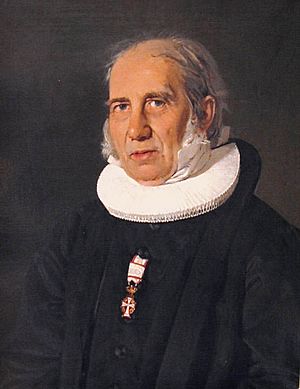
Grundtvig in pastoral garments
|
|
| Born | 8 September 1783 Udby, Zealand, Denmark–Norway
|
| Died | 2 September 1872 (aged 88) |
| Occupation | Lutheran minister, teacher, author, poet, philosopher, historian |
| Children | Svend Grundtvig |
Nikolaj Frederik Severin Grundtvig (8 September 1783 – 2 September 1872), often called N. F. S. Grundtvig, was a very important person in Denmark. He was a Lutheran pastor, writer, poet, and teacher. He also worked as a historian and politician.
Grundtvig's ideas greatly shaped Danish history. His philosophy helped create a new kind of national feeling in the late 1800s. This feeling was based on Danish literature and strong spiritual beliefs. He played a big part in forming modern Danish national identity. He lived during the Danish Golden Age, a time of great art and culture in Denmark.
Contents
Early Life and Education
N. F. S. Grundtvig was born in Udby, Denmark. His father, Johan Ottosen Grundtvig, was a Lutheran pastor. Young Grundtvig was often called Frederik by his family and friends.
He grew up in a very religious home. His mother also respected old Norse legends and traditions. He learned about the European Age of Enlightenment, which focused on reason. But his ideas were also shaped by German romanticism and ancient Nordic history.
In 1791, he went to Thyregod to live and study with a pastor. Later, he studied at the Aarhus Katedralskole from 1798. In 1800, he moved to Copenhagen to study theology at the University of Copenhagen. While at university, Grundtvig began to study Icelandic and the old Icelandic Sagas.
Career and Influence
In 1805, Grundtvig became a tutor on the island of Langeland. He spent his free time studying famous writers like Shakespeare and Schiller. In 1802, his cousin, Henrich Steffens, returned to Copenhagen. Steffens's lectures helped Grundtvig see new ideas in literature.
Grundtvig's first work, On the Songs in the Edda, was not very popular. But his book Northern Mythology (1808) and a play called The Fall of the Heroic Life in the North (1809) were more successful.
In 1810, Grundtvig had a strong religious experience. He became a very devoted Lutheran. He then worked as a chaplain in his father's church in Udby. His new beliefs were shown in his book The First World Chronicle (1812). In this book, he wrote about how people have viewed God throughout history. He also criticized some famous Danes.
After his father died in 1813, Grundtvig wanted to take over the church. But he was not allowed to. In the next few years, he wrote many books, articles, and poems. He also edited a journal called Danne-Virke.
From 1813 to 1815, he tried to support the Norwegians against the Swedish government. He later preached that Denmark's weak faith caused the loss of Norway in 1814. His sermons were very popular in Copenhagen.
In 1825, Grundtvig published a pamphlet called The Church's Rejoinder. This was a response to a professor named Henrik Nicolai Clausen. Clausen believed the Holy Bible was important but not enough to fully explain Christianity. Grundtvig disagreed. He said that Christianity was not just a theory to be learned from the Bible. He questioned if scholars should be the only ones to explain the Bible.
Because of this, Grundtvig was taken to court and fined. The Church of Denmark stopped him from preaching for seven years. During this time, he wrote many religious books. He also visited England three times (1829–1831) and studied Anglo-Saxon history.
In 1832, Grundtvig was allowed to preach again. In 1839, he became a pastor at the Vartov hospital church in Copenhagen. He stayed there until he died. He wrote many hymns, including "God's Word Is Our Great Heritage". He wrote or translated about 1500 hymns in total. These hymns changed Danish church services.
From 1844, Grundtvig became very active in politics. He helped write the first constitution of Denmark in 1848. In 1861, he was made a bishop in the Church of Denmark. He continued to write and preach until just before his death.
Christian Beliefs
Grundtvig's Christian beliefs changed over his life. He started with a strong "Christian awakening" in 1810. Later, he believed in a Christianity that focused on the church community and sacraments (like baptism). He called himself a pastor, not a theologian. This showed that his ideas were different from academic theology.
He believed in the power of the "living word" instead of just old writings. He wanted each church community to be mostly independent. Even though he was a strong Christian, Grundtvig was also very interested in the old Scandinavian faith. He even created the name "Asatro" for it. This name can mean "the Aesir faith" or "loyal to the Aesir."
Ideas on Education
Grundtvig is known as the founder of the folk high school idea. These schools were for adults and focused on practical skills and national culture. He wanted to change the Sorø Academy into a popular school. He believed universities should prepare students for active life in society, not just for academic study.
He thought that practical skills, national poetry, and history should be important parts of learning. King Christian VIII and his wife, Caroline Amalie, supported Grundtvig's ideas. But the king's death in 1848 stopped these plans. However, one of Grundtvig's supporters, Kristen Kold, had already started the first folk high school.
Grundtvig also dreamed of a "Great Nordic University" in Gothenburg, Sweden. He called it the "School for Passion." His two main school ideas were the "School for Life" (folk high school) and the "School for Passion" (university). The folk high schools would focus on national culture. The university would focus on universal, scientific knowledge.
Grundtvig wanted education to be full of freedom, poetry, and creativity. He valued wisdom, kindness, and equality. He was against forcing students to learn, like with exams. He believed these things stopped human creativity. Instead, he wanted to encourage discovery and cooperation in learning.
Anglo-Saxon Literature
In 1815, a scholar named Grímur Jónsson Thorkelin published the first edition of the poem Beowulf in Latin. Grundtvig noticed some mistakes in Thorkelin's translation. Johan Bülow, who had supported Thorkelin, then offered to support Grundtvig's new translation into Danish.
The result, Bjovulfs Drape (1820), was the first full translation of Beowulf into a modern language. Before this, only parts of the poem had been translated into English.
Grundtvig then studied other Anglo-Saxon writings. He found many old English and Latin texts that showed the spiritual life of the early Church in Northern Europe. He was very inspired by these old Christian and historical writings. He visited England several times to study old manuscripts. Beowulf and Anglo-Saxon literature continued to inspire Grundtvig throughout his life.
Family Life
Grundtvig was married three times. His first wife was Elisabeth Blicher (1787–1851). They married in 1818 and had three children. His second wife was Marie Toft (1813–1854). She died a few months after giving birth to their son. In 1858, when he was 76, he married Asta Reedtz (1826–1890). His son, Svend Grundtvig (1824–1883), became known for collecting and editing Danish ballads (folk songs).
Legacy
Grundtvig's ideas and work left a lasting mark on Denmark:
- Grundtvig's Church in Copenhagen was designed as a memorial to him. It is a large church built in a special style and was finished in 1940.
- The Grundtvig International Secondary School in Nigeria is also named after him.
- His hymn De Levendes Land was chosen as an important piece of Danish literature in 2006.
- Grundtvigian Forum is a religious movement based on his ideas. It is located in Copenhagen.
Veneration
The Evangelical Lutheran Church in America remembers Grundtvig on September 2nd. He is honored as someone who helped renew the church.
See also
 In Spanish: Nikolai Frederik Severin Grundtvig para niños
In Spanish: Nikolai Frederik Severin Grundtvig para niños
 | Sharif Bey |
 | Hale Woodruff |
 | Richmond Barthé |
 | Purvis Young |


